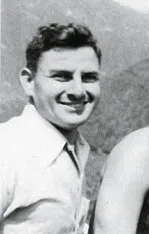Allen M. Singer, ’48: 1923–2016

Allen M. Singer, ’48, a notable San Francisco lawyer, passed away May 10, 2016. He was 92 years old.
Singer served as an officer in the Army Air Force during World War II and had just completed his air crew training when the war ended in 1945. Afterward, he attended the Law School on the GI Bill. Even though he spent most of his career in San Francisco and elsewhere away from Chicago, Singer’s relationship with the Law School played a central role throughout his life.
“Allen’s whole connection with the Law School was extremely important to him,” said friend Bob Raymer, MBA ’43. “Serving as chairman of the Bay Area Alumni Club in the earlier years of its existence, Singer identified continuously with the University community and always had something to relate about Chicago Law.”
Raymer continued, “At that time the Law School was, as it is now, a very intense and interesting place. It was a leader in nontraditional legal education—economics, logic, philosophy, history, and other disciplines unique to usual legal studies; and even today, plainly different from other schools. That experience hit Allen pretty hard, and he never forgot about it.”
In 2013 Singer established the Allen M. Singer Scholarship Fund and the Allen M. Singer Professorship Fund through the largest bequest intention in the history of the Law School.
“Allen was a true champion of our school,” said Dean Thomas J. Miles, the Clifton R. Musser Professor of Law and Economics. “His continued support of the Law School throughout his career—and now through his generous bequest—is truly remarkable. I was lucky to have had the opportunity to meet Allen last winter and witness his genuine enthusiasm for the Law School. It spurred an inspiring and memorable conversation, for which I am grateful.”
Former Dean Michael H. Schill, the Harry N. Wyatt Professor Emeritus of Law and now the President of the University of Oregon, remembered Singer as “an incredibly dedicated graduate of the Law School.”
“He had a distinguished career, devoting himself very intensely to his law practice, and never forgot how the University of Chicago Law School contributed to his success,” Schill said. “In particular, he credited Edward Levi with influencing his intellectual growth. While I am saddened by his passing, Allen’s wonderful bequest will provide needed support for the school’s faculty and students and will ensure that future generations will benefit from the same experience Allen had.”
Singer was born on December 30, 1923, in Minneapolis to William Singer and Ida Simenstin Singer. He grew up in Cedar Rapids, Iowa, and was an only child.
Upon graduation from the Law School, Singer practiced law at various firms in San Francisco. In 1958, he took time off from his own practice to continue his legal education. He earned an LLM degree from Harvard Law School and then spent several years as a faculty member at the University of Oregon Law School. He taught a variety of courses, and he was known to tap into his Law School roots and teach via the Socratic method.
When he later returned to San Francisco, he was a partner at the law firm of Erskine & Tulley. One of his clients was surrealist painter Gordon Onslow Ford. The two men established a lifelong friendship, which gave Allen a new appreciation for creativity and the arts. Art became an important part of Singer’s later life, and he built a fine collection of Onslow Ford’s works.
Soon thereafter, Singer left private practice to join San Francisco–based ABM Industries (formerly American Building Maintenance, Inc.) as vice president and general counsel. In 1962, Singer was instrumental in taking the company public. He loved his work there as it offered a wide variety of law practice.
“Allen was a key leader of a once-small community of Chicago graduates in San Francisco. He was warm, welcoming, dedicated, and unassuming,” said Roland E. Brandel, ’66, former president of the University of Chicago Alumni Club of the Bay Area. “Allen led projects, from fundraising to recruiting, in order to assist the University and also to integrate new Chicago arrivals to the Bay Area into the ex-pat UChicago community. His commitment to Chicago was infectious. Many of us followed where Allen led. The result: a strong, deep, supportive, and now large and vibrant alumni presence in the Bay Area that is an important part of Allen’s legacy.”
In his free time, Singer also loved to read and attend the San Francisco Symphony. He was also an avid Giants baseball fan, watching them on TV often.
“Allen was wonderfully farsighted,” Raymer said. “He continually sought to be an effective lawyer and at the same time to test the cutting edge of what was new or emerging in law practice—and in life. And he certainly did.”


